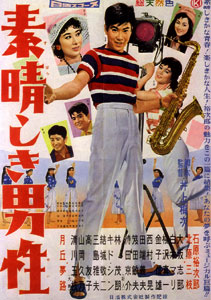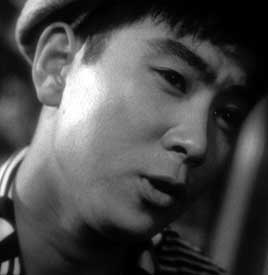 This tale of privileged youth in the 1950s Japan places them predominantly in a beach environment of swimming, water skiing, sailing, club dancing to wondrously awful hip period jazz music provided by Toru Takemitsu, gambling, & cruising to get laid.
This tale of privileged youth in the 1950s Japan places them predominantly in a beach environment of swimming, water skiing, sailing, club dancing to wondrously awful hip period jazz music provided by Toru Takemitsu, gambling, & cruising to get laid.
Risque in its day, Crazed Fruit (Kurutta kaijitsu, 1956; also known as Juvenile Jungle or Passions Juveniles) is only slightly shocking today. It is truly a new era for teens or twenty-somethings who know little or nothing of the conservatism of Japan before the war.
Natsuhisa (Yujiro Ishihara) is what we'd now call a player. He has a gangsterish style though he's really just a kid. His younger brother is Haruji (Masahiko Tsugawa), a scrawny naif who has yet to get laid, is not interested in the sorts of slutty girls his brother & their friends easily pick up, but is certainly looking for love.
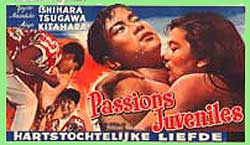 A chance meeting with Eri (Mie Kitahara) captures innocent Haruji's interest. He imagines her a lot like himself in innocence & longing. She allows him to fall in love with her as she likes the way he makes her feel about herself. A chance meeting with Eri (Mie Kitahara) captures innocent Haruji's interest. He imagines her a lot like himself in innocence & longing. She allows him to fall in love with her as she likes the way he makes her feel about herself.
Haruji's brother isn't as wise in the way of the world as he thinks he is, but he suspects right away Eri is not the wholesome clean-cut girl she acts like. At a club one night he spots her with an older American man & right away thinks she's a "hostess," but in fact she's married to the foreigner.
At the first chance he gets, he corners Eri & tells her to stop playing games with his little brother. She insists that despite her marriage she really likes Haruji.
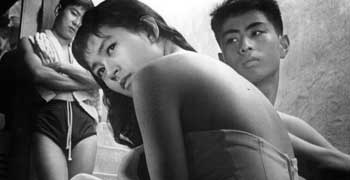 Natsuhisa says he'll keep quiet about her if she'll date him. Despite her protests, it seems Eri doesn't care who she sleeps with or doesn't, as long as she can also date Haruji. Natsuhisa says he'll keep quiet about her if she'll date him. Despite her protests, it seems Eri doesn't care who she sleeps with or doesn't, as long as she can also date Haruji.
Eri is skilled at balancing the secrets of her love life. Her husband (Harold Conway) knows nothing. Haruji loses his virginity so happily, not suspecting a thing. And Natsuhisa is going a little nutty knowing everything, for the first time falling in love, losing his player's control over his emotions.
He knows that to Eri, he's just another guy like others she has slept with. It rankles that Haruji is special to her. With Haruji perpetually in the dark about what's going on, his older brother is only secretly in an intense competition, & the always-close brothers begin to move apart.
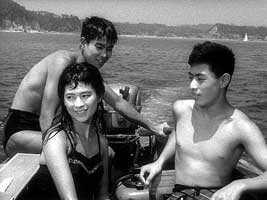 Among the supporting characters, the guy who stands out as most interesting, surprisingly tall, & good looking to boot is Frank (Masumi Okada) who affects the manner of Elvis Presley or James Dean, is a leader of teens, & whose sailboat is so signal to the film's startling climax. Among the supporting characters, the guy who stands out as most interesting, surprisingly tall, & good looking to boot is Frank (Masumi Okada) who affects the manner of Elvis Presley or James Dean, is a leader of teens, & whose sailboat is so signal to the film's startling climax.
The film overall comes across as the disaster-movie version of Beach Blanket Bingo (1965). By the end, the tragedy of it is too over the top to be believable, but it's a good film even though subject-wise I hadn't expected it to be as riveting is it turned out to be.
The acting is excellent, the cinematagraphy quite good. The social milieau of the post-war period for priveleged & largely unsupervised teens is itself rather interesting given that so much of Japan was still rebuilding & struggling at this time.
We catch no glimpse of post-Occupation turmoil, other than in the dangerous emotions of well-off kids adapting Americanisms as a matter of fad & experiencing a sexual revolution devoid of parental supervision.
copyright © by Paghat the Ratgirl
|
